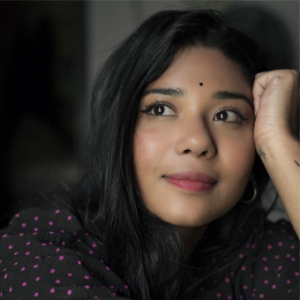Positive Legal Developments for LGBTQ+ Travelers In Nepal
The good news is Nepal has taken a consequential step towards LGBTQI+ rights in Asia. In 2007, the act of same sexual activity was legalised under the judicial system showcasing a progressive stance in comparison to many of the neighbourhood countries. The registry happened in November of 2023 recording it to be the first same-sex marriage between a transgender woman and a cisgender male. However, this legal step was further reinforced on 27th April 2024 as a groundbreaking moment. The Ministry of Home Affairs issued a regulation amidst the local authorities to register same-sex marriage in Nepal in a separate register making it the 37th country in the world and the second nation in Asia after Mongolia to legalize such matrimony. This was a significant win for the Lesbian, Gay, Bisexual, Transgender, Queer, and Intersexual LGBTQI+ rights activists who fought long for this day to come.

Despite the recognition, the legal landscape for Lesbian, Gay, Bisexual, Transgender, Queer, and Intersexual LGBTQI+ rights in Nepal remains somewhat perplexed. While the Constitution disallows discrimination based on sexual orientation and gender identity, legal protections fall short in some areas.
During the conversation with the program manager of Blue Diamond Society Mr. Prashu Ram Chaudhari he mentioned “ Public opinion on LGBT legal rights in Nepal hasn't been formally assessed, but there's still a lingering stigma surrounding these identities. The legal framework for transgender individuals allows them to change their gender marker on official documents to "O" (other) but doesn't have provisions for binary transgender people to have their preferred marker of "M" (male) or "F" (female). This creates challenges for transgender individuals who may not identify with the "other" category.”
Social acceptance of LGBT identities in Nepal is a work in progress. Many LGBT people face discrimination, violence, and exclusion, particularly those who challenge traditional gender roles. Despite these challenges, Nepal has shown a remarkable commitment to expanding legal rights for its LGBT citizens. Many social rights activists join forces with LGBT rights organizations in Nepal operating within the country to spread awareness and the progress made in recent years is a testament to the tireless work. Organizations like Blue Diamond Society are crucial in advocating for legal reforms, promoting social acceptance, and creating safe spaces for the LGBT community. While the journey towards full equality is ongoing, Nepal's legal laws and the diligence of Nepal’s LGBTQI+ rights activists offer hope for a more inclusive future.
Footprint Adventure Welcomes the LGBTQI+ Community
As a local travel company in Nepal, Footprint Adventure supports the rich and distinct nature of travel that includes welcoming the members of the LGBTQI+ community from national and international levels with open arms. At Footprint Adventure we understand the safety concerns that LGBTQI+ travelers have while traveling and finding LGBTQ+ tours in Nepal. Our guides are knowledgeable and sensitive towards the specific needs of transgender travelers and LGBTQI+ issues and are committed to providing safe and inclusive space for anyone wanting to explore the beauty of Nepal. Footprint Adventure champions LGBTQI+ travel and fosters a welcoming environment for all. We partner with LGBTQI+ inclusive accommodations ensuring you feel comfortable and respected throughout your adventure. So, pack your bags, embrace the spirit of wanderlust, and let Footprint Adventure help you explore Nepal with peace of mind!
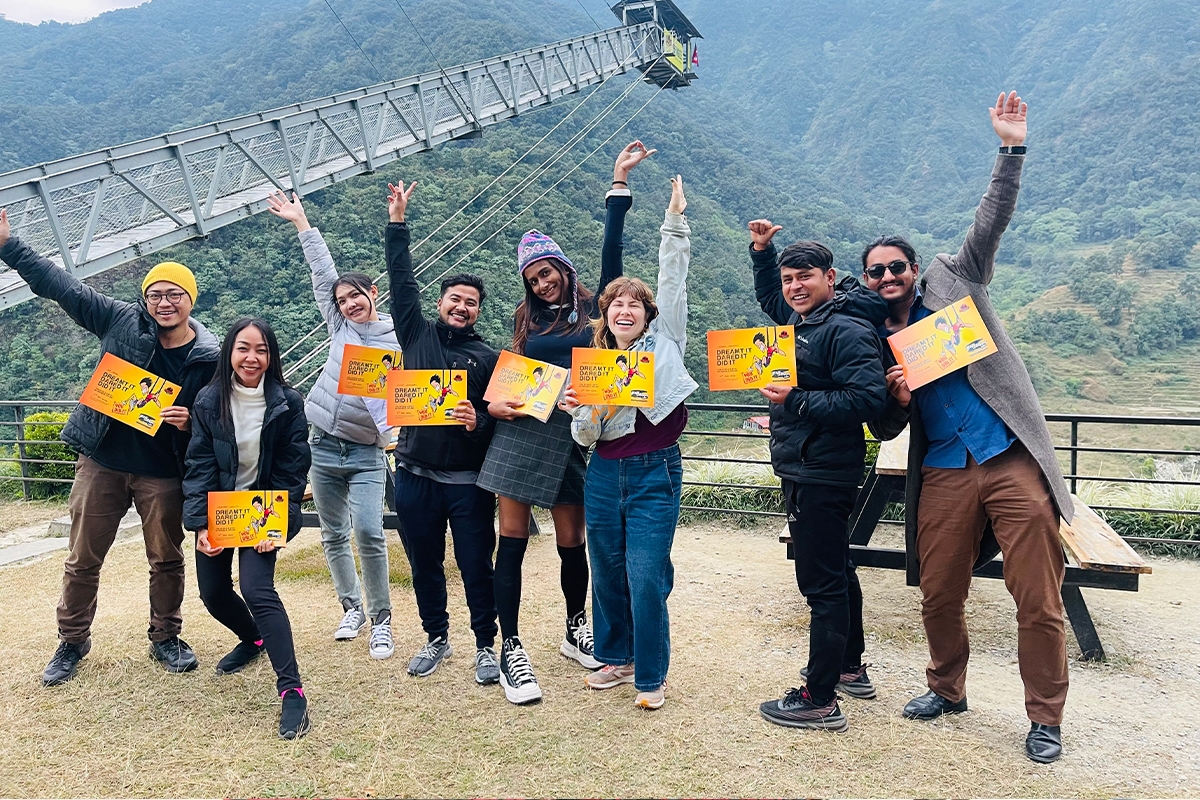
In keeping with this spirit, we were proud to host a unique retreat program in 2022 specifically designed for 13 members of the Asia Pacific Transgender Network (APTN) in Pokhara, Nepal. The 2022 APTN retreat in Pokhara was a resounding success. It provided a platform for the transgender community to connect, celebrate, and explore in an atmosphere of acceptance and understanding. This experience solidified Footprint Adventure's dedication to creating inclusive travel experiences that cater to the diverse needs of all travelers, including the LGBTQI+ community.

Footprint Adventure's commitment to LGBTQI+ travel safety was paramount throughout the retreat. We partnered with accommodations in Pokhara that are renowned for their LGBTQI+ inclusivity, ensuring our guests felt comfortable and respected during their stay.
Footprint Adventure is involved in promoting Pink Tourism in Nepal through several key initiatives:
- Partnerships: We work together with LGBTQI+ organizations and LGBTQI+ inclusive hotels for accommodation purposes to showcase Nepal's LGBTQI+-friendly travel options.
- Pride in Our Guides: Our team has knowledgeable and culturally sensitive guides who understand the specific needs of LGBTQI+ travelers and provide tips for LGBTQI+ travel in Nepal for a safer and more comfortable experience.
- Itineraries: We design itineraries catering to budget-friendly LGBTQI+ travel along with the interests and needs of the LGBTQI+ traveler.
- Promoting LGBTQI+ Owned Businesses: We support and encourage LGBTQI+ owned and operated businesses within the tourism sector. PINK Tiffany Kathmandu, an LGBTQI+ club in Kathmandu is famous for hosting community members in a safer environment.
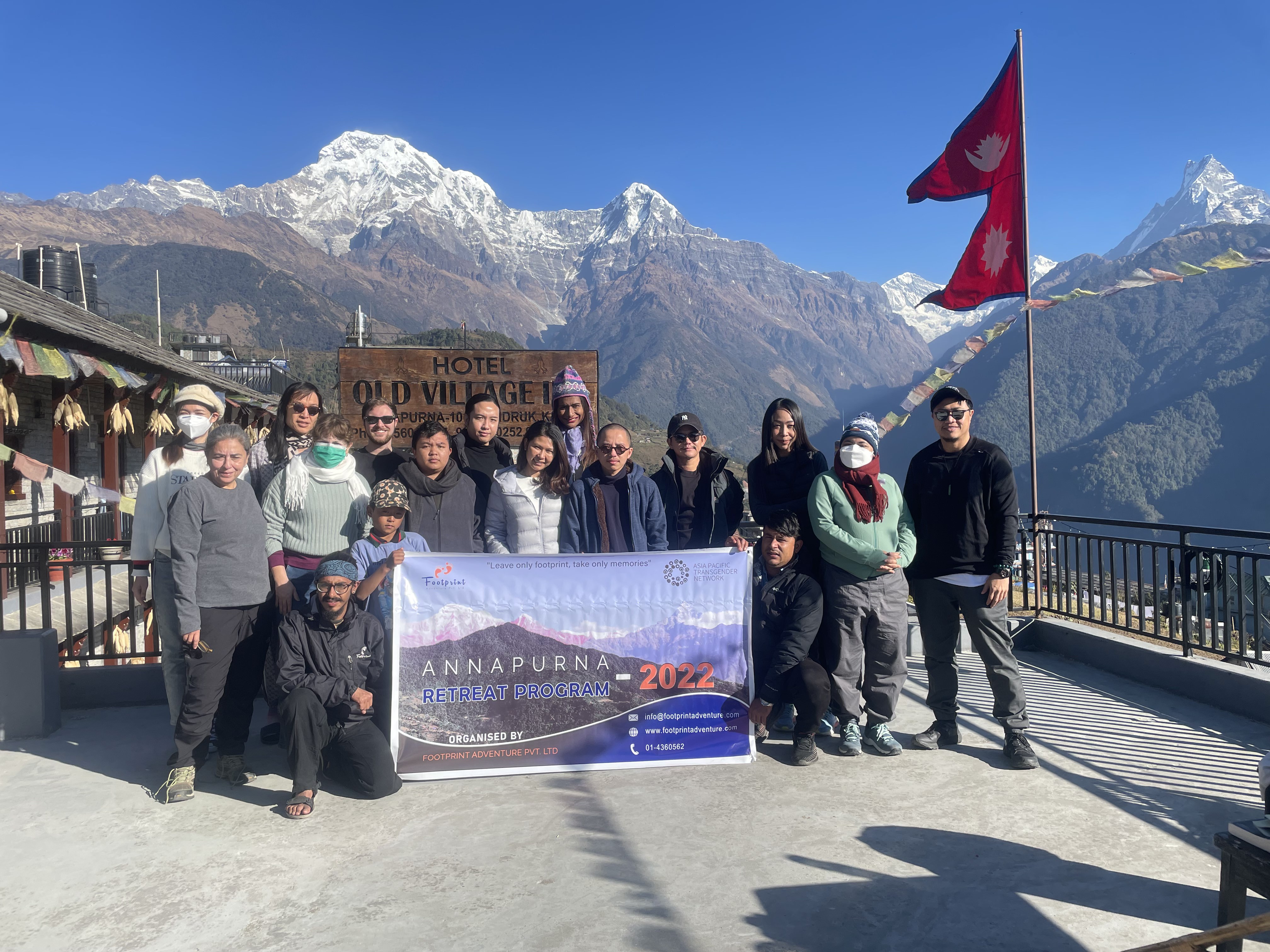
By harnessing the power of social media platforms like Instagram and TikTok with trending hashtags like #PinkTourism, #LGBTQIAtravel, and #TravelwithPride, we can spread the message of Nepal's inclusivity to a global audience.
Pink Tourism in Nepal
Pink tourism in Nepal opens doors to a plethora of experiences dedicated to LGBTQI+ travelers. Whether you are a foodie exploring Kathmandu's vibrant LGBTQI+ restaurant scene, an adventurer willing to go on an electric white-water rafting on the Trishuli River, or a cultural enthusiast on a Kathmandu Tour celebrating the rich cultural heritage we cater to every possibility, imagine yourself trekking through the Annapurna Base Camp with like-minded LGBTQI+ adventurers, sharing stories and laughter. Travel and rejuvenate your mind with LGBTQ+-inclusive yoga retreats in Nepal in the lap of the Himalayas connecting with a supportive community.

Outcomes for a Brighter Future
The rise of Pink Tourism in Nepal holds a massive potential for GDP, and foreign exchange and builds a strong foundation for social acceptance and inclusivity to both the LGBTQI+ community and the Nepal Tourism industry itself. LGBTQI+ travelers seeking a welcoming and safe travel destination will discover a sanctuary in Nepal. Footprint Adventure is committed to playing a pivotal role in this positive transformation.
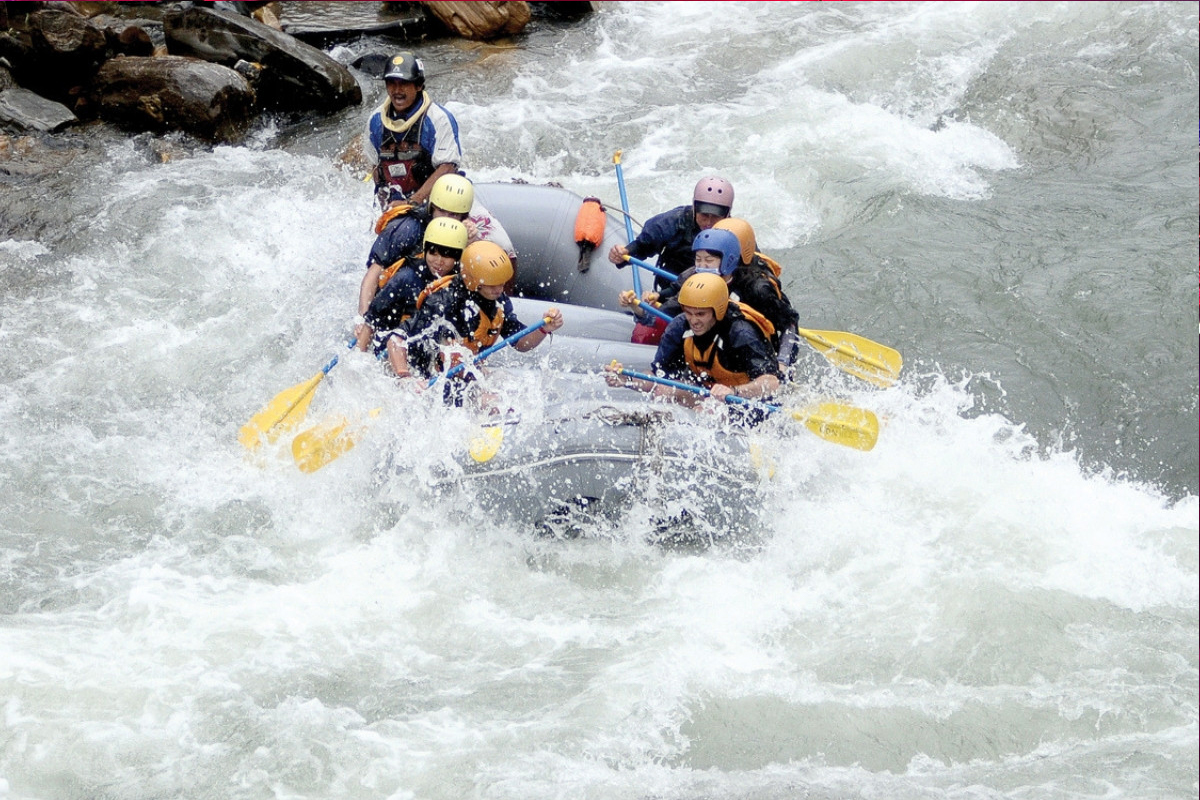
Best times to travel to Nepal for LGBTQI+ travelers
Here's a breakdown of the best times, considering both weather and potential cultural events:
- March to May (Spring): March, April, and May offer pleasant weather with sprouting wildflowers making the trails ideal for trekking and exploring the vibrant atmosphere of the Himalayas. The trails are less crowded compared to the peak season. Though at this time there are no particular LGBTQI+ events the environment is more relaxed and appealing. You can choose popular treks in Nepal like Mardi Himal Trek, Annapurna Base Camp Trek, Annapurna Circuit Trek, and even the famous Everest Base Camp Trek.
- September to November (Autumn): The autumn season in Nepal is ideal for experiencing crystal clear skies and majestic mountain views. The temperature during this time of the season is comfortable for trekking. Teej, one of the popular Hindu festivals in Nepal is celebrated during September which you might find interesting.
- June to August(Monsoon): The monsoon season in Nepal is underrated but one of the most stunning seasons to trek to Nepal. Along with the unparalleled beauty, there are consequences due to heavy rainfall that can disrupt your travel plans due to floods and landslides. If you plan to visit Nepal during these seasons rain might be an important factor in potential travel disruption.
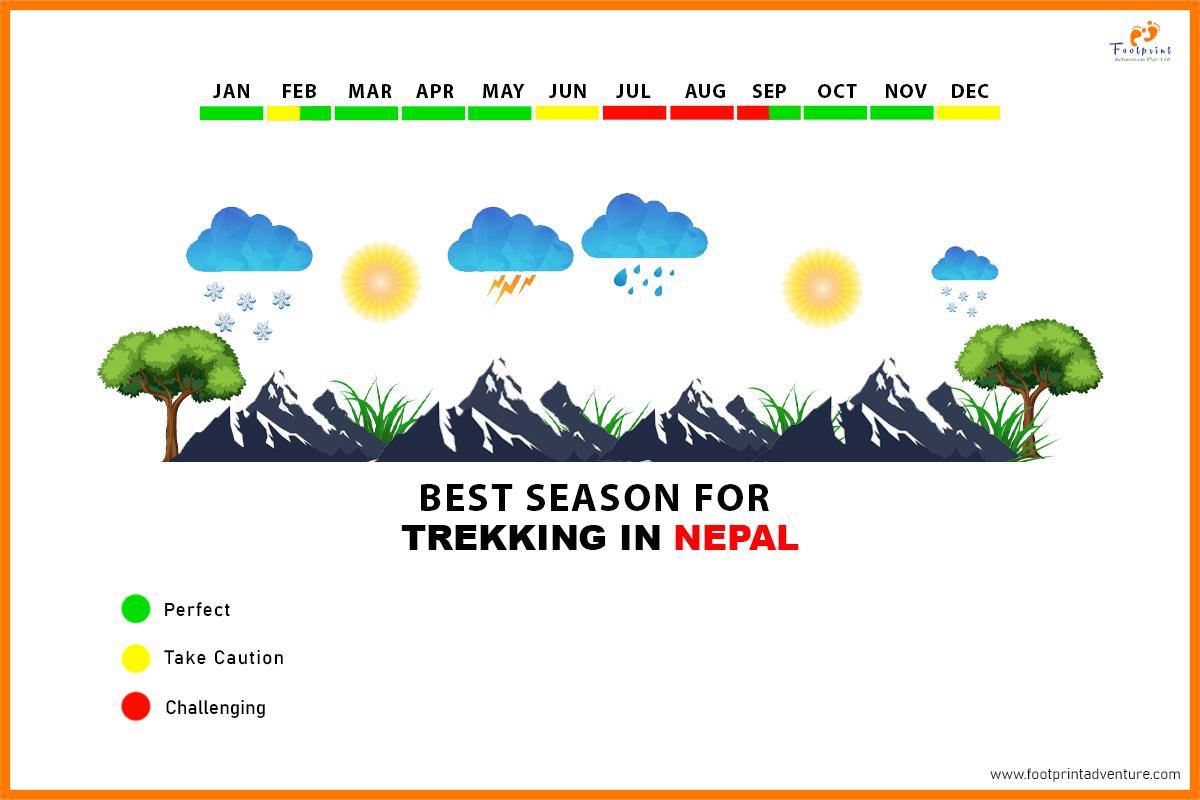
Cultural Events:
Pride Events: Nowadays pride celebration happens almost nationwide, and similar-scale LGBTQIAP+ events are held in Kathmandu during International Pride Month. Blue Diamond Society hosted a Drag show in partnership with a child-focused organization Save the Children, Nepal at Hard Rock Cafe in Kathmandu on the 21st of June 2024. If specific dates are important, consider contacting local LGBTQI+ organizations like the Blue Diamond Society for more information.
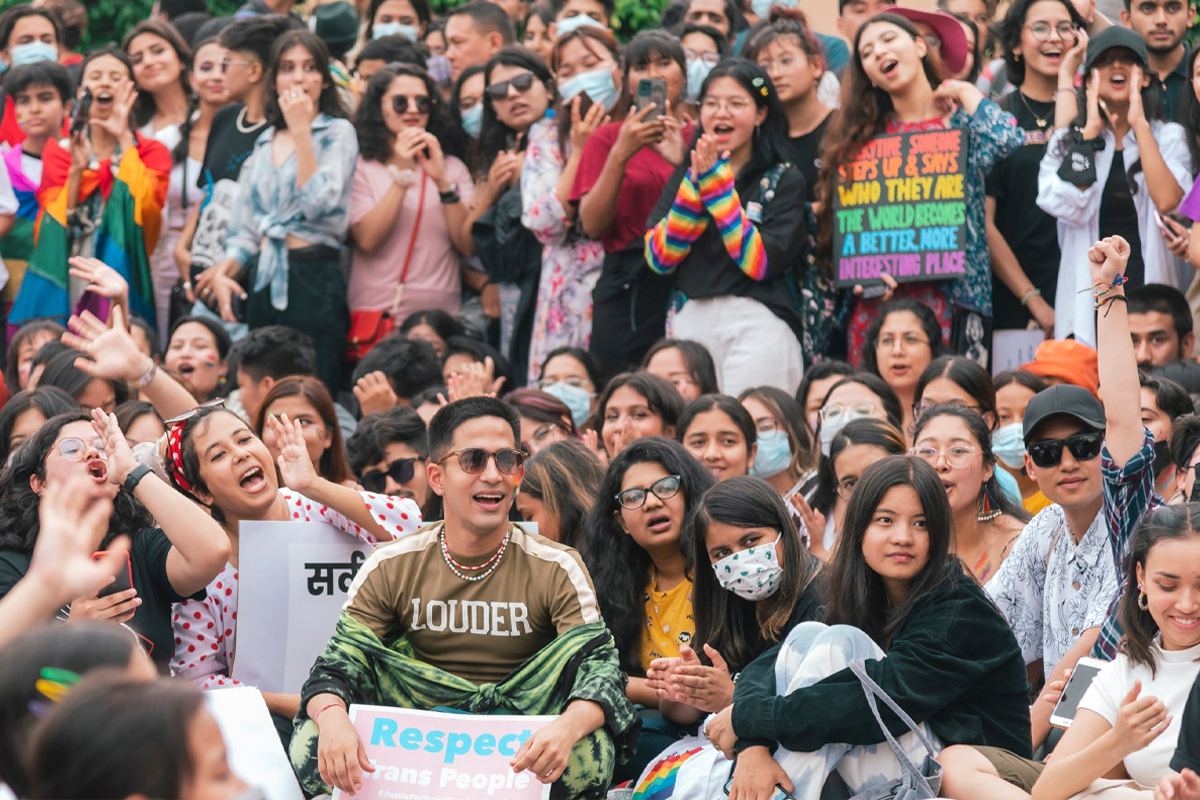
The shoulder seasons (March-May & September-November) offer the best combination of pleasant weather, manageable crowds, and potential cultural experiences. However, if you have your heart set on attending a local Pride event, aim for June and be prepared for the possibility of rain.
Essential Tips for a Safe and Comfortable LGBTQI+ Adventure in Nepal
Nepal, with its awe-inspiring landscapes and rich cultural heritage, is an emerging destination for LGBTQI+ travelers seeking adventure and acceptance. Here are some unique tips to ensure your Nepali adventure is both safe and comfortable:
- LGBTQI+ Scene & Friendly Accommodations: Utilize online resources and travel blogs focused on LGBTQI+ travel in Nepal. Look for "LGBTQI+ friendly hotels in Kathmandu" or "gay guesthouses in Pokhara" to find welcoming accommodations or contact our tour operator to find one. Cafes and restaurants in Kathmandu like Cafe Mitra and Inclusive Galaxy welcome LGBTQI+ members.
- Cultural Nuances: Public displays of affection are generally uncommon in Nepal, respectful hand-holding or a light hug with your partner is unlikely to offend. Research Nepalese cultural norms to ensure a smooth experience in Nepal.
- LGBTQI+ Organizations: Reach out to organizations like the Blue Diamond Society or the Mitini Nepal Society to connect with the local LGBTQI+ community. They can offer valuable insights and recommendations for a more fruitful experience.
- LGBTQI+ Nightlife: Kathmandu's LGBTQI+ scene is where you can come across gay bars in Nepal or LGBTQ dance bars in Thamel like Pink Tiffany in Kathmandu.
- LGBTQI+ Friendly Trekking Companies: While trekking is a classic Nepali experience, some companies may be more inclusive than others. Look for companies that promote LGBTQI+ travel and have experience catering to diverse groups.
- Respectful Dress Code: While Nepal has become more progressive, dressing modestly, especially outside major cities, is a good idea. Opt for loose-fitting clothing that covers knees and shoulders for a more respectful travel experience. While paying a visit to the Temples in Kathmandu consider wearing clothes that cover your shoulder, knee, and back.
- Learn a Few Nepali Phrases: Trying a few basic Nepali phrases like "Namaste" (hello) or "Dhanyabad" (thank you) goes a long way in showing respect and fostering positive interactions with locals.
- Celebrate Local LGBTQI+ Businesses: Support LGBTQI+ owned and operated businesses like cafes, restaurants, or souvenir shops.
Additional Tips for a Safe and Enjoyable Experience
Over time Nepal has become more progressive and accepting towards helping and researching LGBTQIAP+-friendly establishments, such as restaurants, hotels, cafes, guides, and LGBTQ-friendly tours. Some additional considerations to keep in mind during your visit to Nepal would be dressing modestly, especially outside Mojaro cities, which can help you blend in and avoid unnecessary attention. General safety precautions especially during the night time should be followed to be on the safer side.
By understanding the legal landscape of Nepal, respecting local customs in Nepal, and utilizing the available resources like connecting with the Blue Diamond Society, a leading LGBTQ+ rights organization in Nepal, or traveling with a trusted travel company in Nepal, LGBTQ+ travelers can have a safe and unforgettable experience while exploring the beauty of Nepal.
FAQS
Is Nepal safe for LGBTQI travelers?
Yes, Nepal is considered one of the most progressive countries in South Asia regarding LGBTQI rights. Same-sex sexual activity is legal, and the Constitution prohibits discrimination based on sexual orientation and gender identity. However, societal attitudes are still evolving. While major cities like Kathmandu are generally safe, public displays of affection might be uncommon outside tourist areas. Always be cautious and respectful of local customs.
What are the legal rights of LGBTQI people in Nepal?
Nepal's constitution guarantees rights against discrimination based on sexual orientation and gender identity. The Supreme Court has also recognized the rights of same-sex couples to marry (although the law hasn't been implemented yet). For the latest legal updates, consult reputable LGBTQI rights organizations in Nepal.
How is LGBTQI culture perceived in Nepal?
The attitude towards LGBTQI+ people is evolving in Nepal. Although some traditional views still exist, the acceptance is growing day by day, especially in city areas. There are limited but vibrant cafes, bars, and clubs targeting the community.
Are there any LGBTQI-friendly neighborhoods or areas in Nepal?
Kathmandu is the most LGBTQI-friendly city in Nepal with areas like Thamel known for their openness. You can search online or consult with a travel agency for LGBTQI-friendly accommodations known for their inclusivity.
Are there any LGBTQI nightlife options in Nepal (bars, clubs, events)?
Yes! Pink Tiffany is a well-known bar/club catering mostly to the LGBTQI nightlife scene in Kathmandu. Events like movie nights or social gatherings are also available.
Are there any LGBTQI community centers or organizations in Nepal?
LGBTQI community centers and organizations are still developing in Nepal. Blue Diamond Society is an active organization working for the welfare of the people in the LGBTQI community in Nepal.
Is it appropriate to dress in a way that expresses my LGBTQI identity in Nepal?
Nepal is a conservative society overall. While expressing your identity is generally safe in tourist areas, be mindful of local customs when dressing. Opt for modest clothing outside major cities.
Can I hold hands with my partner in public in Nepal?
Public displays of affection are not as common in Nepal as in Western countries. Holding hands is generally tolerated, but avoid overly affectionate behavior, especially outside tourist areas.
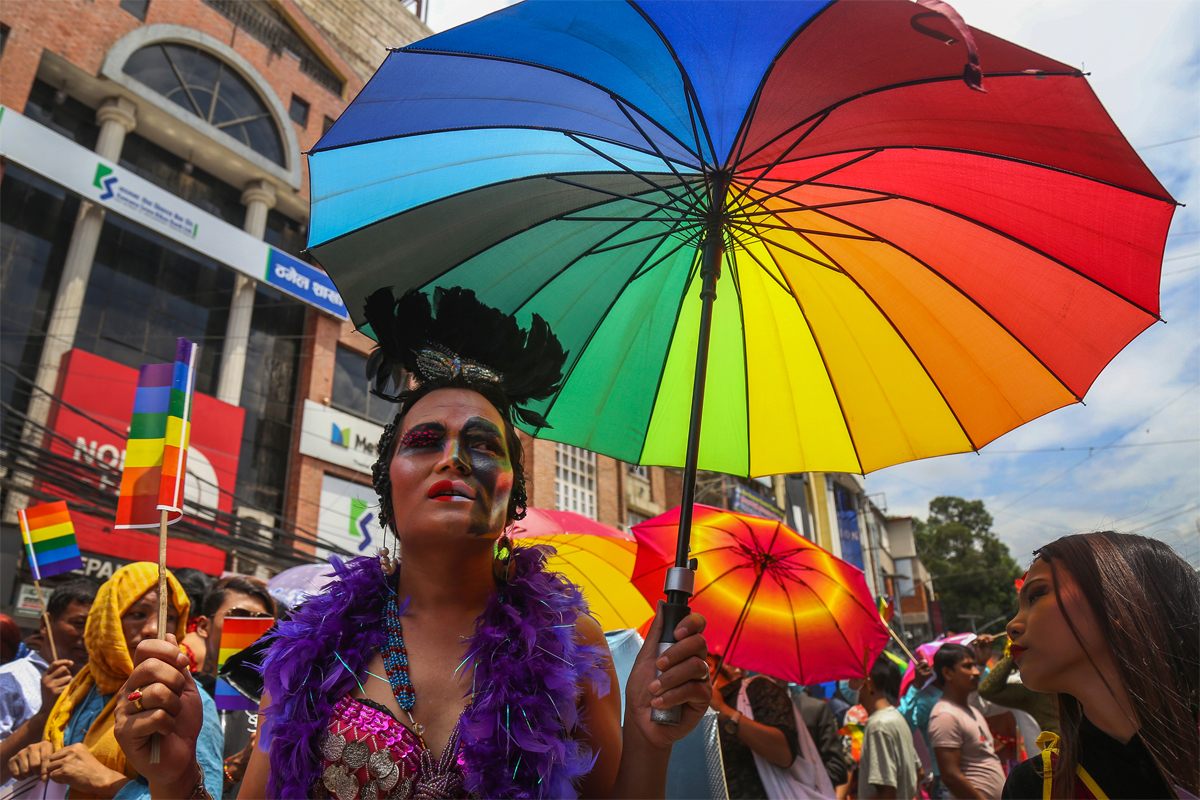

.jpg)








